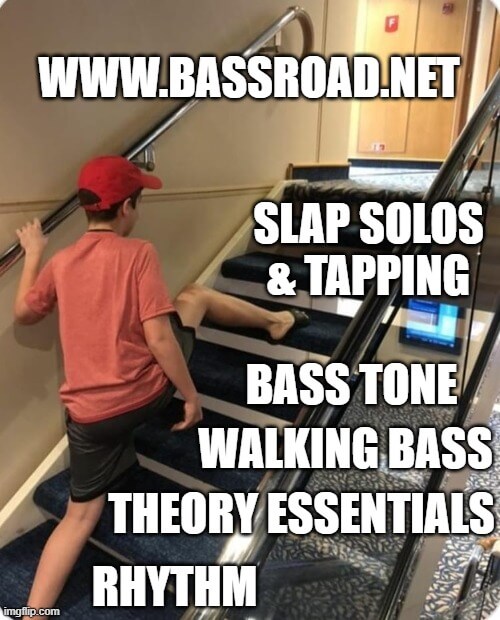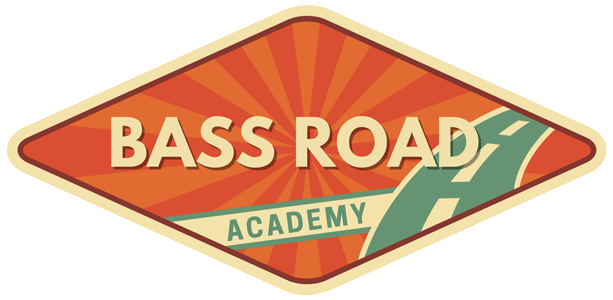Bass Rhythm Comes First
I just received an email from a fellow bassist. He’s not a beginner, he’s been playing for years.
He says he can play solo bass, but struggling with the rhythm side of things.
More specifically: how to come up with a rhythm on bass for a song?
This made me think.
There must be a lot of players out there with a similar struggle?
It must be possible that one can play for years, go through the beginner or even intermediate stage technique-wise, and in other aspects like being able to perform songs, yet still, miss it?
The thing is – when you are a self-thought bassist, it’s so easy to miss learning things. Just imagine using random resources that you find online, jumping from lesson to lesson. One day you’re busy learning that cool two-hand tapping lick, the next day you’re playing a 12 bar blues.
We’re all guilty of going down that noodle-on-bass rabbit hole.
In this post, we need to talk about rhythm, seriously.
Bass Rhythm – First and Foremost
When you look at the bass guitar instrument, and its role in the modern band – it has a supportive duty to serve first and foremost.
The bass guitar should add depth (low-end frequencies) and reinforce the rhythm of a song. It flirts in a space between being a strictly rhythmic instrument (like drums) and melodic where it acts as a bridge between chords of the song and rhythm section.
Considering that chords are defined by their root note that more often than not played as the lowest note in the chord – this idea alone puts so much power into the hands of the bassist.
Before I go further, I want you to check out this interview/lesson with Victor Wooten about the power of rhythm (groove). It serves as a great demonstration of what a powerful role bassist has in a band.
How to Get Better at Rhythm on Bass
If you’re a beginner on bass, you’re probably wondering when should you start looking into practicing rhythm?
Here we come to the main thing I’d like to stress in this post: you start learning about rhythm and practicing performing different rhythms as soon as you start learning bass.
There is no specific pre-requisite or milestone that you need to reach before you can start working on your rhythm skills.
For example, in my online course Bass Guitar for Beginners – weeks 3 and 4 are reserved strictly for studying the basics of rhythm and how to perform those rhythms on bass. My students start from zero, knowing nothing about bass to learning rhythm basics in the first few weeks of practice.
There are 4 playing assignments related to the rhythm in those two chapters of my bass course for beginners. To pass those assignments you need to understand and then practice performing basic rhythms and note durations on bass. You need to shoot a video to demonstrate your current progress with it. Finally, you’re recording bass line assignments over real music backing tracks emulating the exact experience you’d have if you were to play in a band.
So what I want to say is that you need to work on your rhythm skills as soon as possible. As Victor Wooten demonstrated in the above video, rhythm (when you play a note) is much more important than notes themselves (which note you play).
The rhythm side of things is in the spotlight. As long as you keep the groove going, you can play pretty much any note and it will still sound good (or at least somewhat good hehe).
But if you can’t keep a groove going over a song, or completely stop playing – everyone notices immediately. By the way, read my post on what to do when you make a mistake on stage to prepare for the scenario as that will happen.
So what do I need to study exactly?
Learn how rhythm in music works. Stuff like time signatures, how bars of music are filled with notes, and most importantly – note durations.
Note durations – notice the word durations. That’s the key. You need to learn how to play and hold a note for a specific amount of time. Note durations in combination with when you play those notes will define a groove.
Rhythm can be as diverse as melodic lines you play on bass with all those scales and note choices.
Learn how to play the whole, half, eighth and 16th notes for start. That’s a good starting point for every bass player!
Don’t be embarrassed to keep it simple
With social networks today where you’re exposed to all those virtuoso bass players, it’s so easy to get a wrong picture of what really matters.
If you study all the best songs in the world, you’ll find that none of those bass lines are in no way overplayed, too complicated, virtuosic. Those songs are good because the bass player does his job well – keeping it on the ground. Simple yet effective. That’s the name of the game we play. If you do your bass job well – you’ll notice dancing, heads bobbing, and feet stomping.
I’ve seen it so many times that I can call it a danger zone: beginner bass players going for too much too soon.

Never skip learning the basics. Never be afraid to just play root notes in a steady 8th notes groove.
Learn how to play music by Johnny Cash, learn to play blues, maybe a jazz standard or two. Classical music? Good idea!
It doesn’t matter if you’re a heavy metal bassist or want to play ska music, you need to practice and play the “basic stuff” – that is the only way to become a good bass player.
Rhythm First Education
When I’m designing my online bass courses, I’m all about the practical application of what you’re learning. This means practicing and performing bass lines – and then sending me proof you did it (like a video).
What’s interesting here is that once you submit a video recording of your playing, we’ll end up most of the time talking about rhythm. We’ll also talk about the tone – another core aspect of playing bass which I’d like to talk about in another post.
You see, rarely I would comment like: hey, that’s all cool but you played 5th instead of 6th fret in bar 2. That is pretty much never the issue! The most constructive feedback I send my students revolves around when and for how long those notes are played = rhythm on bass.
…and when students go back to practice and submit a new video – results are in 90% of the time huge improvements. The formula for getting better at rhythm is practice time + self-evaluation/feedback from pros = better rhythm and timekeeping skills.
Simple as that. But you need to practice the rhythm side of things from the very start. You also need to somehow be able to evaluate your performance and playing so that you know what you’re doing wrong and where to focus in your practice sessions.
Practice, Play
All my courses feature musical examples that you need to learn and be able to perform with a strict focus on the things lessons you’re working on at the moment and emphasizing.
With bass it is just not enough to understand how rhythm works, you need to get it under your fingers. You need to play songs. That is the only way to get better at it.
My advice to the person who inspired this post would be:
- Video record yourself performing one of the songs or trying to improvise a bass rhythm over a backing track.
Evaluate the recording from a 3rd party perspective and be honest with yourself (or get a bass teacher to evaluate your playing) - Be prepared to become a beginner, once again at least for a bit.
- Go back to basics, study, and practice rhythm with help of instructional materials you find inspiring to go through.
- Learn about note durations, rhythm subdivisions, time signatures, and practice everything you’re learning. The theory here is just not enough.
- Over time you’ll get so much better at it and with experience of learning and performing many songs and rhythms, you’ll be able to start improvising your own rhythms and composing cool-sounding bass lines.
It doesn’t matter if you don’t feel like a beginner or if you’ve been playing for a while, skipping things like working on rhythm chops is something that is guaranteed to plateau your progress.
I’ve seen students on various levels that just skipped learning one or a few core skills along the way – it happens.
What matters is how you go about it when you encounter a stumbling block!
Do you go back to the woodshed and practice your ass off, or you try to mask it trying to convince yourself that it’s “fine”?
The later option never works…
Good thing is that learning bass is a lifelong journey. It never ends. You never master bass.
But it’s so profound and life-changing. After all – we’re all for the journey, right?
By the way, if you’re like to start learning bass in a structured way from zero, then I suggest that you enroll in my Bass Guitar for Beginners online course:
You’ll start with how to hold bass and have lots of video submission assignments along the way once we go into the basics of rhythm.
This course also features no talking whatsoever.
It’s a kind of less talking – more playing type of course where you need to do the legwork.
If this sounds interesting, click on the link below to see more details and enroll:
